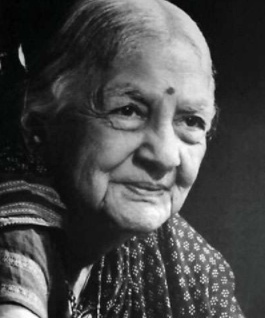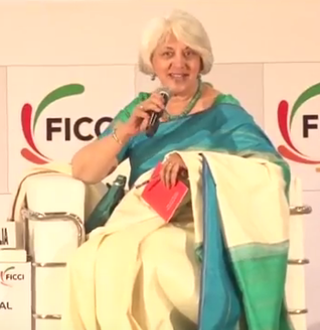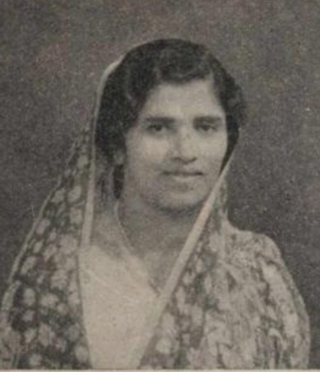Related Research Articles
The Padma Bhushan is the third-highest civilian award in the Republic of India, preceded by the Bharat Ratna and the Padma Vibhushan and followed by the Padma Shri. Instituted on 2 January 1954, the award is given for "distinguished service of a high order ... without distinction of race, occupation, position or sex." The award criteria include "service in any field including service rendered by Government servants" including doctors and scientists, but exclude those working with the public sector undertakings. As of 2020, the award has been bestowed on 1270 individuals, including twenty-four posthumous and ninety-seven non-citizen recipients.

Kamaladevi Chattopadhyay was an Indian social reformer. She has worked for the promotion of Indian handicrafts, handlooms, and theatre in independent India to uplift the socio-economic standard of Indian women. She is the first woman in India to contest in elections from Madras Constituency, but lost.

Durgabāi Deshmukh was an Indian freedom fighter, lawyer, social worker and politician. She was a member of the Constituent Assembly of India and of the Planning Commission of India.

Sudha Ragunathan is an Indian Carnatic vocalist, singer and composer. She was conferred the Kalaimamani award by the Government of Tamil Nadu in 1994, Padma Shri (2004) and Padma Bhushan (2015) by the Government of India, and Sangeetha Kalanidhi by Madras Music Academy in 2013.
Shantha Sinha is an Indian anti-child labour activist. She is the founder of Mamidipudi Venkatarangaiya Foundation, popularly known as MV Foundation, and is a professor in the Department of Political science in Hyderabad Central University. She headed the National Commission for Protection of Child Rights for two consecutive terms ; The National Commission for Protection of Child Rights (NCPCR) was set up in March 2007 under the Commission for Protection of Child Rights Act, 2005, an Act of Parliament. Sinha was its first chairperson. She was awarded the civilian honour of Padma Shri by the Government of India in 1998.
Ratan Thiyam is an Indian playwright and theatre director, and the winner of Sangeet Natak Akademi Award in 1987, one of leading figures of the "theatre of roots" movement in Indian theatre, which started in the 1970s. Also known as Thiyam Nemai, Ratan Thiyam is known for writing and staging plays that use ancient Indian theatre traditions and forms in a contemporary context. A former painter, and proficient in direction, design, script and music, Thiyam is often considered one of leading contemporary theatre gurus.

Isher Judge Ahluwalia was an Indian economist, public policy researcher, and professor. She was Chairperson Emeritus, Board of Governors, at the Indian Council for Research on International Economic Relations (ICRIER). She had also served as the chairperson of the board of the International Food Policy Research Institute, and the chairperson of the Government of India's High-Powered Committee on Urban Infrastructure Services. She was awarded India's 3rd highest civilian award, Padma Bhushan, in 2009.

Nirmala Deshpande was a noted Indian social activist who had embraced Gandhi and philosophy. She devoted her adult life to the promotion of communal harmony and service to women, tribal people, and the dispossessed in India.

Mridula Sinha was an Indian writer and politician who served as Governor of Goa from August 2014 to October 2019. She was the first woman Governor of Goa.
Vidyaben Shah was an Indian social worker and activist known for her work with children, women and the elderly in India. While she was already serving as Vice-President, she was appointed the first non-officio President of the New Delhi Municipal Council (NDMC) by Prime Minister Indira Gandhi in 1975. She has held several leading positions in the field of social welfare since the 1940s. Vidyaben Shah died at the age of 97 on 19 June 2020 at her residence in Delhi, her son Mihir Shah confirmed the news of Vidyaben Shah death.
Renana Jhabvala is an Indian social worker based in Ahmedabad, India, who has been active for decades in organising women into organisations and trade unions in India, and has been extensively involved in policy issues relating to poor women and the informal economy. She is best known for her long association with the Self-Employed Women's Association (SEWA), India, and for her writings on issues of women in the informal economy.

Mithu Alur is the founder chairperson of The Spastic Society of India – now rechristened ADAPT – Able Disable All People Together. She is an educator, disability rights activist, researcher, writer and published author on issues concerning people with disability in India.
Manju Bharat Ram was an Indian educationist, who was the founder, chairperson of the managing committee and member of the board of trustees of The Shri Ram Schools, New Delhi; ranked as India's No. 1 day school by Education World’s Schools survey in 2008, 2009 and 2011.
Gutta Muniratnam was an Indian social worker, a member of the National Planning Commission of India and the founder of Rashtriya Seva Samithi (RASS), a non governmental organization engaged in the social welfare activities in over 2500 socio-economically backward villages in the Rayalaseema region, spread across the present day states of Andhra Pradesh and Telangana. He was honored by the Government of India, in 2012, with the fourth highest Indian civilian award of Padma Shri.

Achamma Mathai was an Indian social worker, women's rights activist, a co-founder of Dr. John Mathai Centre, an institute of Information Technology, Economics, Management, Theatre Arts and Music under the University of Calicut and the wife of John Mathai, the first Railway Minister of India and a former Finance minister. During her stay in Delhi, when her husband was serving in the Union Ministry, she was reported to have been involved in activities related to children's education. During the riots that followed Indian independence, she worked alongside Sucheta Kripalani for the rehabilitation of the riot victims. She served as a member of the Advisory Committee for Libraries in 1955 and as the chairperson of the Central Social Welfare Board in the early Sixties. The Government of India honoured her in 1954, with the award of Padma Shri, the fourth highest Indian civilian award for her contributions to the society, placing her among the first recipients of the award.
Queenie H. C. Captain was an Indian social worker known for her contributions to the welfare of the visually impaired people in India. She was the co-founder and the president of the National Association for the Blind, the largest non governmental organization for the blind people in India, from 1961 to 1972. She also served as the vice president and the chairperson of the finance raising committee of the organization. She was one of the organizers of the World Assembly of the World Council for the Welfare of the Blind held in New Delhi in 1969 and was the leader of the Indian delegation to the Quin-quennial Conference of the World Council for the Welfare of the Blind at Rome in 1959. The Government of India awarded her the fourth highest Indian civilian award of Padma Shri in 1974.
Chitra Jayant Naik (1918–2010) was an Indian educationist, writer, social worker, the chairperson of the Indian Institute of Education and the expert member of the Planning Commission of India. She was the chairperson of the Non-formal Education Committee set up by the Ministry of Human Resource Development and was a member of the National Literacy Mission. The Government of India awarded her the fourth highest Indian civilian honour of Padma Shri in 1986.
Sharayu Daftary is an Indian industrialist and a former president of the Indian Merchants' Chamber (IMC), the first elected president of the organization. She is the first woman president of the Automotive Components Manufacturers Association and the first woman to sit in the executive committee of the Federation of Indian Chambers of Commerce and Industry (FICCI). She is the founder of Bharat Radiators Limited and the president of the Dakshin Bharat Jain Sabha. The Government of India awarded her the fourth highest civilian honour of the Padma Shri, in 2004, for her contributions to the Indian industry.
Kunwar Singh Negi was an Indian braille editor and social worker. He has transliterated 300 books into braille. His major works include Bhagwan Buddha Ka Updesh and Hazrat Muhammad Ki Vani, both being about teachings of Gautam Buddha and Muhammad. He was presented with Indian civilian awards Padma Shri in 1981 and later with Padma Bhushan in 1990.
References
- ↑ "Our Reference". BSS. 2016. Retrieved 28 March 2016.
- ↑ "Insider and Outsider Views Of the Bharat Sadhu Samaj". Hinduism Today. 2016. Retrieved 28 March 2016.
- ↑ "Disabilities Act". Aarogya. 2016. Retrieved 28 March 2016.
- ↑ "Padma Awards" (PDF). Ministry of Home Affairs, Government of India. 2016. Retrieved 3 January 2016.